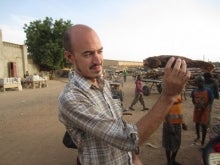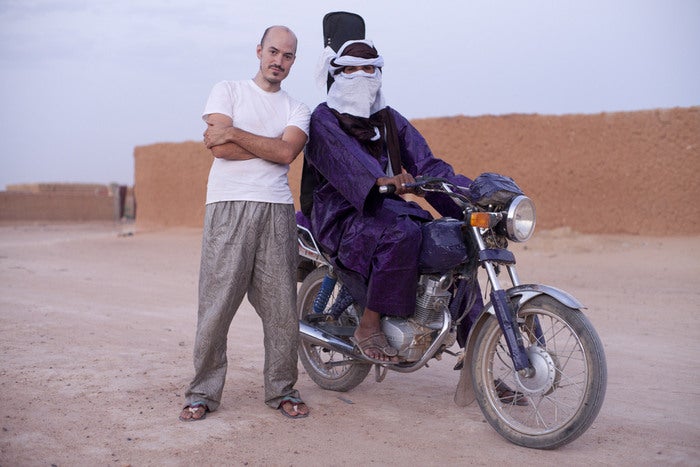Interview: Christopher Kirkley, Sahel Sounds, and Guerrilla Ethnomusicology

Christopher Kirkley is an archivist, artist, curator, and occasional DJ who runs the project Sahel Sounds. His work examines contemporary popular musics in an evolving technological landscape in the Sahara and Sahel regions of West Africa, from the interplay of localized traditions with transglobal influences to new media models of cultural transmission.
Sahel Sounds began as a blog in 2009 to share field recordings and has evolved into a record label, perhaps best known for its compilation Music from Saharan Cellphones. The blog continues as a platform to explore arts and music of the region through nontraditional ethnographic fieldwork. Currently, Chris is fundraising for the production of what may be the first-ever Tuareg language fiction film, Akounak Tedalat Taha Tazoughai (“Rain the Color of Blue with a Little Red in It”)—an homage to Purple Rain and The Harder They Come, and drawing on the experimental filmmaking of Poverty Row, Italian Neo-Realism, and Jean Rouch—which aims to provide an alternative to the dominant narrative of contemporary Tuareg music-as-rebellion by dramatizing the music scene in Agadez, Niger.
We recently discussed some of his projects, the relationship of his work to academic ethnography, and how digital music is being archived in the Sahel. Excerpts from our conversation are reproduced below.

Christopher Kirkley and Mdou Moctar, the star of Akounak, in Agadez, Niger.
----------
ES: As someone following a pretty traditional path for ethnomusicologists [i.e., graduate school] and full of critiques (as well as praise) for the profession, I love that you describe yourself as a “guerrilla ethnomusicologist” and “non-traditional ethnographer.” Can you elaborate on this idea? How do you see your relationship to academics and ethnographers in general? Is that related to how you got involved in your work with Sahel Sounds?
CK: The title is definitely a reflection of how I started working in the field. I originally went to West Africa just to record music. It was kind of project-based, almost like an art project: the idea was to take a field recorder, travel to a part of the world that I didn’t know anything about, and see what I could record. But my impetus for doing that was based around ethnomusicology and ethnomusicological recordings.
At the time, I was playing a lot of folk music and had gotten into a lot of archives, like the Library of Congress archives, the Lomax Archives . . . some of the stuff that was online. . . . I got to listening to these old recordings, and it was really cool because you not only hear these folk songs that had sort of disappeared—they were there, but it was a source of music for me, an inspiration. So I felt that it was important that this stuff had been recorded. And in some of the more interesting ones you could hear some interesting stuff happening in the background. For example, there’s this one recording where you could hear a train in the background as this woman played at a migrant worker’s camp in Fresno.
I thought that, well, whoever recorded this might have had the advantage of being an ethnomusicologist, but I had the advantage of having recording equipment a thousand times better than what they had. So, I thought, “Well, I don’t have the educational background to do this, but I have a technological one-up on these recordings.” And if I just go out, I can just see what I could record. And that was the beginning of the project.
I think that’s come to define my work, because I see that when you’re over there in the field, by putting yourself out there and by just jumping into something, you can find a lot of things that maybe aren’t being represented [on the Internet, etc.]. Coming from outside academia, it’s hard for me to really critique it—I studied engineering, not ethnomusicology—but there’s a perceived lack on my part of just jumping head on in to something, of saying, “Well, I don’t have a background, but I’m just going to go ahead and get started with something.”
ES: I think in many ways that’s the case, or at least for me. I’m coming at it from the opposite end, in a way: the path that I’m following is in some ways very cautious, and also beholden to a system that can, in some ways, be inhibiting. So it’s really refreshing to read about your work and about just jumping right in, getting things done.
CK: Well, I think there’s a way that these approaches really complement each other. I’m not trying to answer certain questions—I’m almost leaving a lot of things open when I’m asking these questions. For example, if I talk to someone like Mariam Ahmed about her role as a woman guitarist [almost unheard of in Tuareg music], she didn’t answer my questions. But you know, my reflections on that are often: Is it a big deal that she’s a woman guitarist? Is it because I’m a man, or a foreigner, that I can’t get in there to really answer these sorts of questions? I’m reflecting more on these things rather than really answering the questions. But I think that by posing these questions and making these recordings, someone like yourself can use that for their inquiries, so we can kind of generate a collective body of knowledge and assist each other.
That’s one thing. Another thing that really interests me is just accessibility of information. When I worked on a project of Hausa pop music from films in Nigeria, and I found an old article by Brian Larkin about it, I wrote him, and he got me in touch with Carmen McCain, a doctoral student who was working in Kano. She put me in touch with a bunch of musicians. And through that I was finally able to put out the record. I found that even though they’d done a lot of extensive work on this music, finding really fascinating stuff like how people in Nigeria are influenced by Bollywood films, they’re making their own movies, and making their soundtracks that copy Indian film music . . . that narrative and that music really wasn’t accessible in the sense of even being able to listen to it. It was there in academic journals, but sort of outside the realm of accessibility to people outside that field of study.
ES: Previously you’ve talked about how, when people run out of storage space for digital files, they simply delete them and replace them with new stuff. Do you still see that going on? Have you seen anyone locally making efforts to store these media, or to create an archive?
CK: Yeah, and the people who are really doing that are the people who have cell phone shops and music download stores. Because those people sell music, there’s a financial incentive. But I think also, just like here, there are people who are just into music and they just save everything. I’ve met a couple people—one kid in Tchintabaraden [Niger] has tons of external hard drives of music and video. Everything he saves and backs up. And it’s cool to see that. Hard drives are really expensive there. But I think that people like this kid, with his hard drives, are going to be really important for archiving the music, but especially the videos. Cell phone videos have been shot at different festivals and musical performances. I just imagine that, whether or not that’s valued now, fifty years from now, when Niger has really got it together, that stuff is going to be just as important as our Library of Congress. Right now it’s just somebody who’s storing it because they want to keep it.
ES: Are they storing much information about their files?
CK: No. Sometimes there are the id3 tags on the mp3, with information about who created it. But some of the mp3 stores rebrand everything; they’ll change the tags to put the name of their business in. It’s kind of annoying—there’s all this information there and it just gets wiped out.
ES: You had to do a lot of tracking people down to get information for your Music from Saharan Cellphones project.
CK: Yeah. But I think that a lot of it is getting easier. I noticed this a lot with Saharan Cellphones—I’d have a song, I wanted to know who it was. I could send out mass emails to thousands of people and I’d never find out what it was. But if I just went to Agadez and asked the first kid on the street, he’d be able to say who it was, the name of the song, where he recorded. So all that information is there, it’s just not accessible because of these barriers of Internet accessibility. But the information’s there.
----------
Chris is planning to release Akounak by July 2014. We've linked to a short teaser below; a longer one is viewable on the project's Kickstarter page. Keep an eye out for more about the film at Sahel Sounds.





